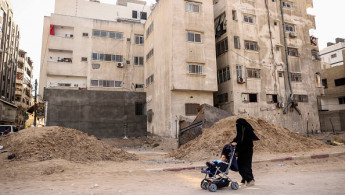A year after Israel's war on Gaza, survivors still mourning
Although a year has passed since Israel's war on the besieged Gaza Strip, dozens of Palestinians in the enclave who survived the attack still smell death and see destruction everywhere they go.
In May 2021, Israel launched an 11-day military campaign on the Gaza Strip, following a barrage of rockets from Gaza, that was in turn fired in response to Israel's encroachment on the Al Aqsa Mosque, the third-holiest site for Muslims.
During the wave of fierce fighting, Israeli warplanes carried out hundreds of air raids on the Gaza Strip, home to over two million people, most of whom are refugees. Over 260 Palestinians were killed, and up to 2,000 were wounded.
At the same time, Palestinian armed factions in Gaza fired thousands of rockets at Israel, killing more than 10.
In addition, the Israeli army committed several massacres that includes the killing of 19 Palestinian families (all of them civilians), amounting to 91 people including 41 children and 25 women.
Al-Wihda Street, in the centre of Gaza City, was one of the most important streets that witnessed complex massacres after being targeted by Israeli warplanes that struck several residential buildings without prior warning to its residents.
The features of the destruction and the cruelty of the scene still remain, since there has not been any reconstruction of these places as of yet due to the Israeli blockade.
Abu al-Ouf, al-Kulak and Shkontana, were among the most prominent families who lost dozens of their members that "terrifying night" of 16 May, when Israeli warplanes targetted residential buildings with dozens of missiles while claiming that tunnels belonging to Hamas were under them.
Speaking to The New Arabs, survivors of these brutal massacres said that they did not expect that they would be "an easy prey" for Israeli criminality, noting that "those tragic moments still haunt them every day."
Alaa Abu al-Ouf lost 14 members of his family, including his wife and two daughters, Shaimaa and Rawan, while his youngest daughter, Maram, escaped death.
"I can't forget that fateful day," the 50-year-old man told The New Arab. That night the sound of the heavy bombing was everywhere, al-Ouf recalled.
"We didn't know what was going on. At first, I thought we were all going to die, but my two daughters died, while my wife was seriously injured," he said.
Despite the pain, he informed his wife about their daughters' death. "I waited for long days for my wife to wake up from a coma, but she died days after the end of the Israeli war."
"I still have nightmares at night and I cannot erase these painful images from my memory," he added.
Shukri al-Kulak faced a similar situation as Abu al-Ouf, his neighbour. Al-Kulak lost 22 members of his family, including his parents, his wife, three of his children, and four of his brothers, in addition to their children.
"Our six-floor residential house was here, but it became nothing now," the 50-year-old father of four said while he was standing in front of an empty square.
"I always thought that we lived in a safe place ... but it seems that it was just the opposite," al-Kulak said, adding that "overnight and all his family members were trapped under the rubble of their house without knowing what their fate was."
Both Abu al-Ouf and al-Kulak said that as of yet they are unable to restore their normal lives "because everything in Gaza reminds them that they have lost security and stability forever."
The Israeli war on Gaza also caused massive material damages estimated at about $US 479 million, according to the Independent Palestinian Commission for Prosecuting the Crimes of the Israeli Occupation.
"Israel's attacks on the Strip have affected hundreds of homes, including a number of residential towers that contain dozens of homes, and legal and media centres such as Al-Jalaa Tower, Al-Shorouk, Al-Jawhara, and Hanady Tower," Ehab Kuhail, the Director-General of the Commission, said to The New Arab.
"The Israeli army deliberately launched its raids without warning; this resulted in heavy losses in Palestinian civilian lives: 50% of the dead victims were women and children, and 65% of the total casualties," he added.
His organization had submitted hundreds of documents to the International Criminal Court, calling for an immediate investigation into the "Israeli crimes committed against the Palestinian people in the Gaza Strip" as well as an indictment against the leaders of the Israeli army as a means to achieve justice and redress for the Palestinian people.








 Follow the Middle East's top stories in English at The New Arab on Google News
Follow the Middle East's top stories in English at The New Arab on Google News
![The UAE is widely suspected of arming the RSF militia [Getty]](/sites/default/files/styles/image_330x185/public/2024-11/GettyImages-472529908.jpg?h=69f2b9d0&itok=Yauw3YTG)
![Netanyahu furiously denounced the ICC [Getty]](/sites/default/files/styles/image_330x185/public/2024-11/GettyImages-2169352575.jpg?h=199d8c1f&itok=-vRiruf5)
![Both Hamas and the Palestinian Authority welcomed the ICC arrest warrants [Getty]](/sites/default/files/styles/image_330x185/public/2024-11/GettyImages-2178351173.jpg?h=199d8c1f&itok=TV858iVg)